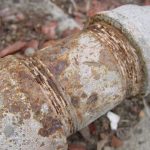Many homeowners develop DIY skills to save money working on projects in their homes. These skills can be applied to simple plumbing problems, such as leaky faucets and unclogging a kitchen sink. But, there are more complex tasks that should be left to a professional plumber because it’s easy to cause more damage and they may be unsafe. A licensed and certified plumber has formal training to work on your plumbing system and this includes a faulty water heater. In this article, we will examine the water heater in more detail, some of the faults that can develop, and how to correct the problems.
A Brief Water Heater Primer
We rely on a consistent source of hot water for showering, bathing, laundry, cleaning and many more tasks in our homes. We tend to take our water heaters for granted until something goes wrong and they stop working. But, a water heater is a hard working appliance and it can fail due to age or neglect. For this reason, we recommend an annual tune-up for plumbing systems that includes the water heater. The plumber can identify smaller issues before they develop into large problems that are more expensive to fix. When a water heater goes wrong, the first question that needs to be answered is how the appliance is powered. The approach to gas or electric powered water heaters is different because they can fail in different ways. Let’s take a look at some common water heater problems for both types, they are:
4 Common Electric Water Heater Problems
The most common electric water heater problems in no particular order, are:
- A faulty thermostat.
- A blown fuse.
- Improperly crossed hot and cold connections.
- A malfunctioning heating element.
In many cases a hot water heater reset can correct the problem if the cause is not one of the four listed here.
4 Common Gas Water Heater Problems
The most common gas water heater problems in no particular order, include:
- A faulty gas valve.
- A gas supply interruption.
- A faulty thermocouple.
- A defective pilot light.
A full reset of the system may work if one of the problems listed here is not the cause. Although a gas water heater doesn’t rely on power it may use electrical sub-systems that can be affected by a power failure or a blown fuse.
Is a Water Heater Repair Viable?
In many cases, a water heater repair is a viable approach, but this will depend on the exact nature of the problem and the age of the appliance. If one of the problems shown above is the cause of a failure, that component can be replaced by a plumber. Another way to fix a water heater is a full reset or the water tank can be flushed clean. It’s important to realize that a water heater consists of multiple components and it’s part of a larger plumbing system.
There may be components that fail quickly due to a fault located somewhere else and this is why a DIY approach is not a viable option. A local licensed and certified plumber has extensive experience that helps them to identify the root cause of the problem. This saves time and money and a fast repair may be possible.
One common problem is the relationship between the thermostat and the water heater. If the water heater is improperly installed, it may not be in sync with the thermostat. There may be piping issues if a new water heater is linked up with older piping systems. Over time, pipes can become clogged with scale and this is hard to recognize without specialized tools.
What About Water Heater Flushing?
Sediment can accumulate at the bottom of the water heater tank and this can lower the energy efficiency. Eventually, this sediment will damage the water heater and lower the useful lifespan of the appliance. We recommend that a water heater should be flushed clean twice per year. If you cannot remember when the tanks were last flushed, it’s time to get it done now. If you have very hard water, you may want to increase this frequency to once every three months. This process can be involved and it’s advisable to contact a local plumber to flush the tank for you.
My Water Heater is Leaking Can it be Used?
The short answer to this question is no. If your water heater is leaking it should not be used until the water leak is fixed. The most common cause of a water leak is the aforementioned sediment build-up at the bottom of the tank. This causes an imbalance in the internal pressure that can cause cracking and corrosion on the surface of the tank. In most cases, a repair is not the best approach and a replacement makes better sense. This may seem like a worse case scenario, but a new high-efficiency water heater will help the homeowner to recoup their investment in energy gains alone. Again, this is a good reason to flush the tank regularly and preventive maintenance is usually the less expensive option.
4 Warning Signs of an Impending Hot Water Heater Repair
A hot water heater doesn’t tend to fail overnight and most of the time there will be some warnings that a failure is pending. Some of these indicators can be recognized by people with no plumbing training if they know what to look out for. Let’s take a look at four common warning signs of a hot water heater problem, they are:
- Age: If the hot water is 13+ years old and it breaks down regularly it’s failing and a replacement is necessary.
- Strange Noises: Some low-level noise is natural when the hot water heater is operating under normal conditions. But, if you start to hear loud or unusual noises this is usually caused by the formation of sediment at the bottom of the tank. Contact your plumber and ask them to flush the tank for you.
- Insufficient Volumes of Hot Water: If your hot water heater cannot meet your needs it should be inspected by a plumber.
- Rusty Hot Water: This is caused by corrosion in the water tank which may be fixed with flushing or a replacement may be a better option.
If you need a water heater repair, flushing or an upgrade contact your local licensed and certified plumber today.





